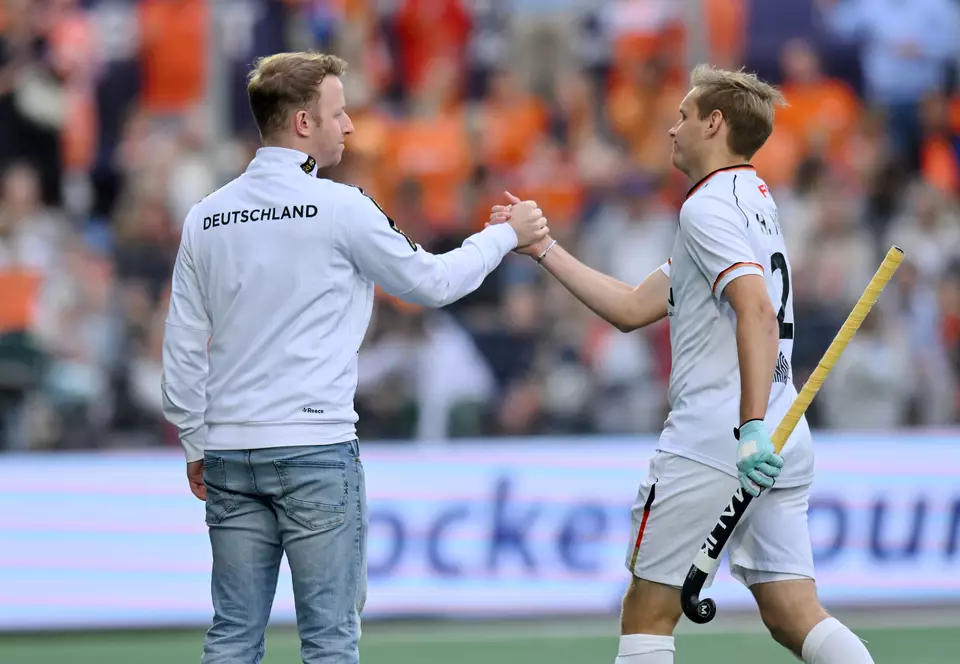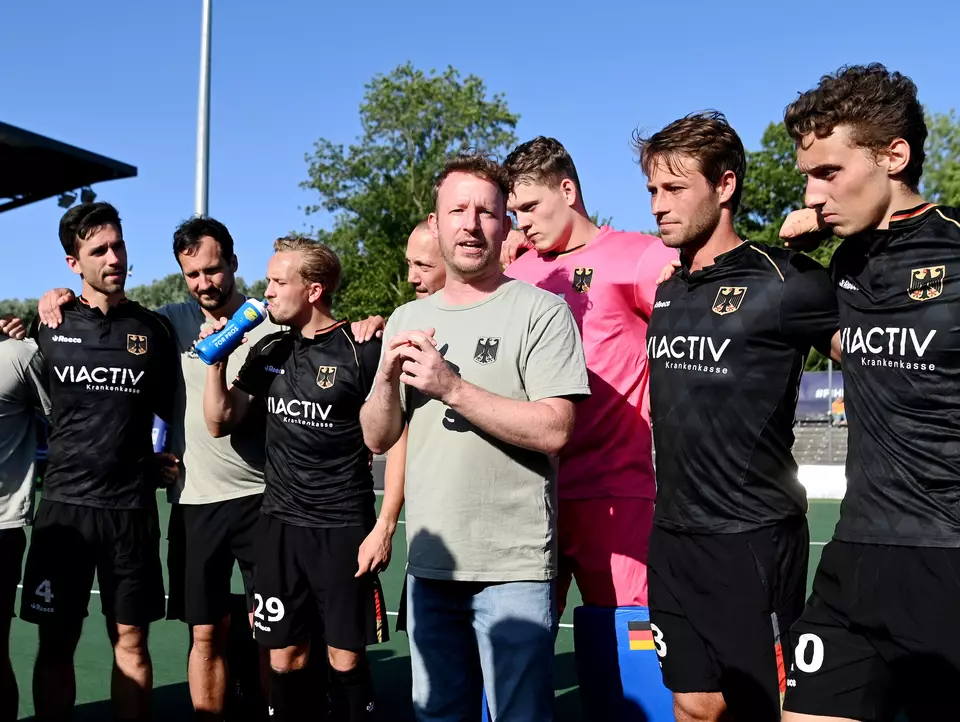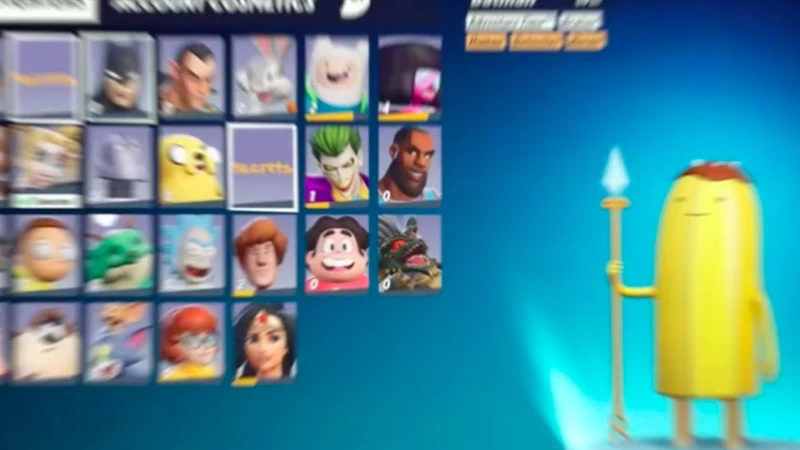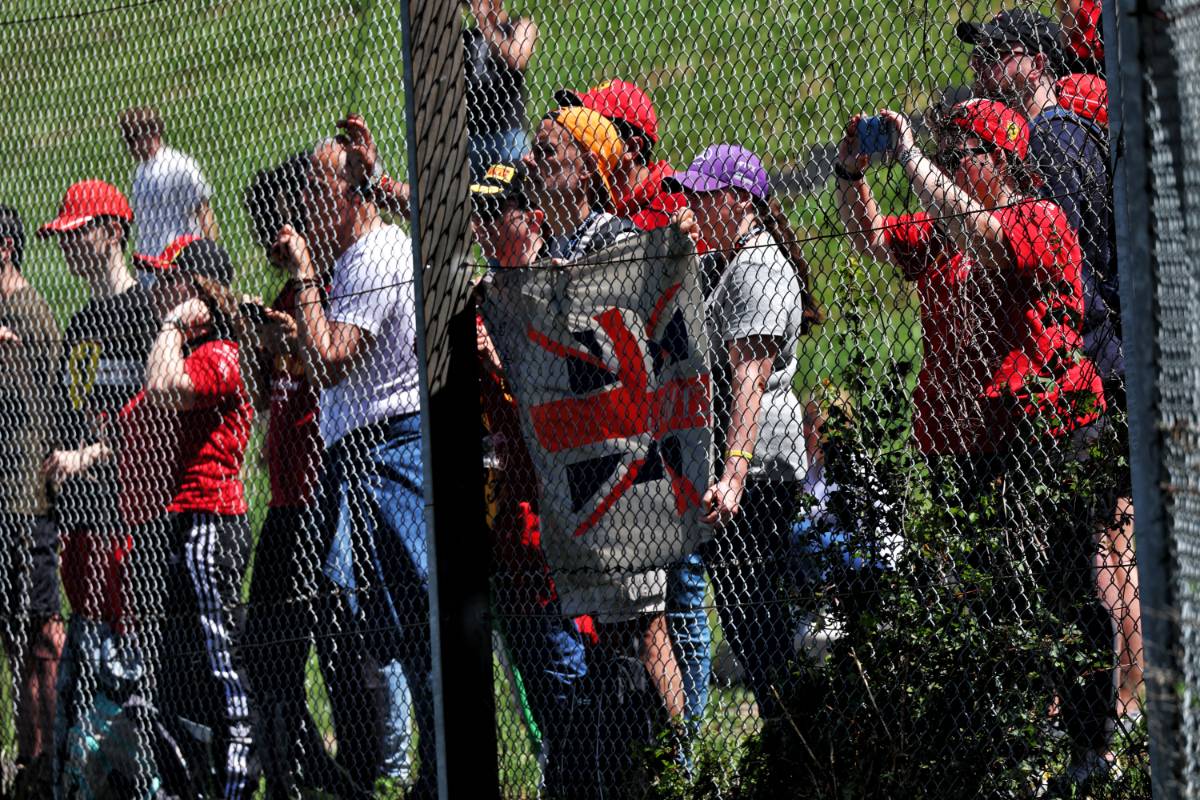Portrait: Men’s national coach André Henning
“In the end, the players decide 100 percent directly about the game.”
10. April 2024
André Henning – national coach of the German men’s national hockey team. He is the youngest head coach of a Bundesliga hockey team ever. The 39-year-old led his team to the World Cup title in India at the beginning of 2023 – in his first major tournament as national coach of the A squad. At the EuroHockey Championships 2023 in his own country, Henning and his team took fourth place. The Olympic Games in Paris are coming up in 2024, where the successful coach from Velbert in the Bergisches Land wants to build on his previous successes. We spoke to André Henning about his career so far and his coaching style.
Growing up on the hockey pitch
“My mother tells me that a few weeks after I was born I was lying in the hockey hall and watching from the equipment room,” André Hennig begins his answer to the question of how he got into hockey. Hennig’s mother Petra played hockey herself, his father Jürgen was a coach at HC Velbert, the club where the world champion coach grew up. Henning’s brother also played for HC Velbert. In other words: André Henning comes from a true hockey family, in which he was even officially trained by his parents at the Velbert Hockey Club at times, which was a challenge for everyone, says the 39-year-old with a smile.
Torn cruciate ligament and early coaching positions
As a B-boy, André Henning decided on the performance-oriented hockey path and moved to the great Uhlenhorst Mülheim. There he took part in the German Youth Championships and made it into the first men’s team at HTC Uhlenhorst, with which he played in the first Bundesliga. Henning’s hockey career ended after a few Bundesliga games because he tore his cruciate ligament at the age of 18. Parallel to his own playing career, he discovered his passion for coaching teams early on. At the age of 14, he began coaching the first children’s and youth teams at his hometown club HC Velbert. For Henning, his injury marked the beginning of his complete focus on his coaching job: “Of course the injury wasn’t nice. But I saw something in the coaching job that appealed to me more, and that’s why I didn’t really suffer from the fact that I didn’t make a real comeback as a player,” says the Velbert native.

Worldsportpics / Frank Uijlenbroek
The youngest Bundesliga coach of all time
When he was just 19 years old, André Henning took over as head coach of his first men’s team that played in the top league: “There were easily two or three players in the ETB Schwarz-Weiß Essen team who could have been my fathers. “It was really an incredibly great team, some of which I still have contact with today,” says André Henning about his start as a men’s coach. After three years, he moved from the upper league team back to Uhlenhorst Mülheim, where, at the age of 22, he took over the position of assistant coach of the first men’s team at HTCU. In addition to his coaching work, Henning studied law, but after six months as an assistant coach, he was faced with a big decision. The head coach position at Uhlenhorst Mülheim had become vacant and players like Jan-Philipp Rabente and Thilo Stralkowski, whom he had already coached in their youth, encouraged him to take over the position. In the end, the young André Henning was persuaded and agreed to be the Mülheim men’s head coach for an initial year.
“One year then turned into seven, and at some point I recognized the signs of the times and stopped studying law. As a head coach it was usually made very easy for me, even though I was still so young, because in both Essen and Mülheim the key players who are in every team and who set the tone always stood behind me and had my back have strengthened.”
André Henning
Training years of a national coach
For seven years, from 2007 to 2014, André Henning was head coach of Uhlenhorst Mülheim, was runner-up three times and took part in the EHL. In 2014 he won the German indoor championship before moving to the club on the Alster in Hamburg. In his first seven years as head coach, he learned about coaching, his teams and himself: “Of course I didn’t have a certain amount of experience that is good for a coach. I lacked wisdom and peace, if you will. I was very stubborn and wanted a lot of things very quickly. In addition, it was only later that I had people at my side who could give me exactly that and ultimately we all had to go through our experiences together. Basically, despite high expectations, the support was always there because people saw that the boy was committed and had something up his sleeve,” says Henning. After a year at the club on the Alster, André Henning moved to Rot-Weiss Köln in 2015, where he won four German championships (2x indoor, 2x field), an EHL title and an indoor European Cup in five years.
He also worked for the German Hockey Association at an early stage.
In parallel to his work as a club coach, Henning began various activities for the German Hockey Association from 2012 onwards. When he started as an association coach, he was an assistant coach alongside Jamilon Mülders for the male U21: “After I, as a club coach, constantly railed against things from the DHB, Jamilon came to me and said – ‘yes, then join in’. That’s how I came to the DHB and then trained the U18 as head coach alongside the U21,” reports André Henning. Back in 2013, André Henning became the sole male U21 national coach and won the junior world championship title in India in the same year. A success that was to be repeated 10 years later with many players from this junior men’s team. In 2015 he became 2015 European champion with the U18 male team.
A trip to the Danas at the 2016 Olympic Games
(From 2014 to) 2016 Henning once again supported Jamilon Mülders. At the Olympic Games in Rio de Janeiro he was assistant coach of the women, who he remembers as a very special team: “The DANAS from Rio were definitely one of the most communicative teams I have ever coached. The team was maximally direct, honest and confrontational. “It was simply fantastic on many levels, in terms of culture, how people looked after each other and what came out of it in the end with the bronze medal,” enthuses André Henning.

Worldsportpics / Frank Uijlenbroek
A cooperative leadership style as a path to success
After the Olympic Games in Rio, André Henning concentrated entirely on his club Rot-Weiss Köln, where he was also the sporting director in addition to his work as head coach. Following the 2021 Olympic Games in Tokyo, he took over the position of national coach from Kais al Saadi at the start of 2022 and was immediately national coach of the German men’s national team. At his first major tournament in January 2023, André Henning won the World Championship in India with his HONAMAS. His coaching seemed to bear fruit immediately – but what exactly is his coaching?
No more bad mood until Wednesday
Of course, many small and big things play a role, but André Henning particularly highlights two topics in the conversation: “At the beginning of my coaching career it was the case that if we lost at the weekend, we were in a bad mood until Wednesday was popular with me. In my head, the defeat was 95 percent my fault. I always questioned everything. For a long time my answer was to do more and, if possible, have a video meeting or something similar,” said the national coach. But over time he realized that a lot doesn’t always help a lot, and he questioned himself and his coaching approach at the time. He was particularly concerned with the question of what a team needs in the team process and how knowledge transfer works with young adults at a sporting level:
“How do my players actually learn the things I want to teach them and how do I take them on board? How do I increase the participation processes so that the players take on more responsibility? Because in the end, the players decide 100 percent directly about the game. I don’t touch the ball or score a goal. I’m only indirectly involved,” says the 39-year-old.
“In the end, the players decide 100 percent directly about the game. I don’t touch the ball or score a goal. I’m only indirectly involved.”
André Henning
Participation and more responsibility as the key to team leadership
Henning has switched to cooperative leadership in recent years, which is a very important building block for success at the World Cup. In the men’s team, the players are repeatedly involved in game-relevant decisions through various group and participation processes, so that a system is created in which mechanisms, tactics, moves and positional play that have grown together within the team are used on the pitch. The entire Honamas coaching team, in which specialists under the leadership of Henning continue to develop the team’s game, also plays a major role.
The success factor of letting pressure bounce off
After winning the world championship title, many hockey fans had high hopes for the men’s team with a view to the European Championships in Mönchengladbach. The national coach didn’t let these outside expectations get to him before the European Championships: “I’m noticing that again now, I noticed that before the World Cup. The supposed expectations from outside really don’t reach me at all. I’m not interested in that, I don’t read that. I can assess what is realistic and derive action goals for myself and my team. That’s all,” said the world champion coach with a view to the home European Championships.
The experience that André Henning has already gained from 25 years as a coach certainly exceeds that of some coaches who have already ended their careers. Hockey Germany can look forward to a German men’s national team at the 2024 Olympic Games that has a focused coach on the sidelines.
by DHB Magazin



















You must be logged in to post a comment Login